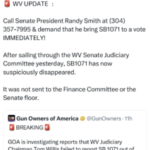New ATF Presumptions that a person is engaged in the business as a dealer:
(1) Resells or offers for resale firearms, and also represents to potential buyers or otherwise demonstrates a willingness and ability to purchase and resell additional firearms (i.e., to be a source of additional firearms for resale);
FLAW: You, a firearms collector, are often buying firearms from World War II. A friend sees a crate of Mosin Nagant rifles you just purchased for display, and you offer to sell it to him. He buys it and tells you he thinks it would look cool on display next to a crate of SKS rifles too. You tell him you’ll keep an eye out for any good deals. ATF will now presume you are engaged in the business of buying and selling firearms.
FLAW: You bought bulk Polymer80s and other 80% kits when they were on sale before they were banned. Your girlfriend wants a gun for home defense, so she buys one of your full-size kits. She drills one of the holes wrong, so you give her another kit and she takes you out to a nice steak dinner. Later, you offer her a subcompact kit she can build for concealed carry and suggest you could build it together next weekend. ATF will now presume that you are engaged in the business of dealing in firearms.
(2) Repetitively purchases for the purpose of resale, or repetitively resells or offers for resale, firearms
(i) Through straw or sham businesses, or individual straw purchasers or sellers; or (ii) That cannot lawfully be purchased, received, or possessed under Federal, State, local, or Tribal law, including:
(A) Stolen firearms (e.g., 18 U.S.C. 922(j)); (B) Firearms with the licensee’s serial number removed, obliterated, or altered, or not identified as required by law (e.g., 18 U.S.C. 922(k) or 26 U.S.C. 5861(i)); (C) Firearms imported in violation of law (e.g., 18 U.S.C. 922(l), 22 U.S.C. 2778, or 26 U.S.C. 5844, 5861(k)); or (D) Machineguns or other weapons defined as firearms under 26 U.S.C. 5845(b) that cannot lawfully be possessed (e.g., 18 U.S.C. 922(o); 26 U.S.C. 5861(d));
FLAW: If you decide to sell a few guns, will the ATF consider you engaged in the business?
(3) Repetitively resells or offers for resale firearms—
(i) Within 30 days after the person purchased the firearms; or (ii) Within one year after the person purchased the firearms if they are—
(A) New, or like new in their original packaging; or (B) The same make and model, or variants thereof;
FLAW: You see a two for the price of one deal on cheap AR-15 lower receivers you don’t want to build two AR-15s, you want to buy a high-quality AR-10. If you offer to resell the two lowers to a friend, ATF will presume you have committed a federal crime.
FLAW: You buy Glocks with sequential serial numbers for your wedding party, but your fiancée cheated, and you break off the engagement. If you try to sell the Glocks to recoup some of your losses and move on from the past relationship, ATF will presume you have committed a federal crime.
FLAW: You buy a three-gun competition loadout from a friend—a rifle, a shotgun, and a pistol—but an emergency comes up where you need the cash to pay for your kid’s cancer treatment in two weeks. If you sell those guns to prevent your child from dying of terminal cancer, ATF will presume you have committed a federal crime.
FLAW: You buy two pistols—a subcompact for pocket carry and a full size pistol—but once you start carrying them, you realize that they don’t fit you properly and you don’t like them. You decide to sell them within 30 days of purchasing and buy different handguns. The ATF now thinks you are engaged in the business and may kick your door in and shoot your dog.
New ATF presumptions that a person has intent to predominantly earn a profit.
(i) Repetitively or continuously advertises, markets, or otherwise promotes a firearms business (e.g., advertises or posts firearms for resale, including through the Internet or other digital means, establishes a website to offer their firearms for resale, makes available business cards, or tags firearms with sales prices), regardless of whether the person incurs expenses or only promotes the business informally;
FLAW: You, a Virginia gun owner, sold a gun last year that didn’t fit well in your hands on VirginiaGunTrader.com. You decide to sell another gun that you bought a few years ago but rarely shoot, so you make a second post online. ATF now presumes that you had intent to predominantly earn a profit.
FLAW: You message your buddies in a group chat on Signal that you’re trying to sell a couple guns you don’t want. ATF will now presume that you committed a federal crime.
FLAW: You put fake price tags on your cheap AR-15s on your gun wall to impress your friends next time they visit your mancave. The ATF now thinks you are advertising and marketing your AR-15s to sell, oh, and you probably don’t have a license for that, do you?
(iii) Makes and maintains records to document, track, or calculate profits and losses from firearms repetitively purchased for resale;
FLAW: You keep bills of sale and copies of driver’s licenses whenever you conduct a private sale in case the police ever ask for your help to trace a firearm. You know who else does that? Dealers.
FLAW: You create a receipt for a private sale of a firearm so you can file your taxes correctly in April. Sorry. ATF now thinks you are a dealer, even though the IRS requires documentation.
FLAW: You keep an inventory of your firearms and mark which ones you sold in private sales.
FLAW: You create a list of your firearms and their value for insurance.
FLAW: You create a list of your firearms and their value for a will.
(iv) Purchases or otherwise secures merchant services as a business (e.g., credit card transaction services, digital wallet for business) through which the person intends to repetitively accept payments for firearms transactions;
FLAW: You’re selling a couple of old guns online and (for some strange reason) your customers don’t want to bring hundreds of dollars of cash to meet a stranger with a gun. Instead, you agree to meet and they’ll Venmo you the cash.
(v) Formally or informally purchases, hires, or otherwise secures business security services (e.g., a central station-monitored security system registered to a business, or guards for security) to protect firearms assets and repetitive firearms transactions;
FLAW: You’ve sold a couple of guns on ArmsList lately to save up for your next gun purchase, but your wife insists on upgrading security with strangers coming to the house. You agree that it is a good idea to protect your collection of firearms and install floodlights at the front and back of your house with attacked Ring doorbell cameras—which are sometimes advertised for business use.
(vi) Formally or informally establishes a business entity, trade name, or online business account, including an account using a business name on a social media or other website, through which the person makes, or offers to make, repetitive firearms transactions; or
FLAW: You create an account on a local firearm trading website but create a username instead of using your real name online.
GOA NOTE: Certain conduct does not support a presumption that you are engaged in the business. However, engaging in such conduct does not mean ATF will automatically (or correctly) presume you were not engaged in the business. Instead, you have to provide “reliable evidence” to the ATF to prove that you are not “engaged in the business.”
SOURCE: ATF 2022R-17 Definition of “Engaged in the Business” as a Dealer in Firearms






